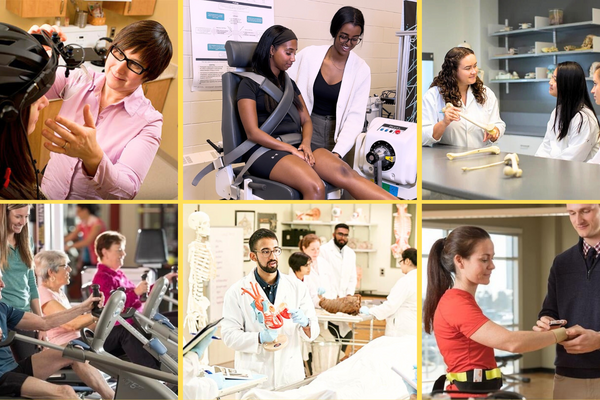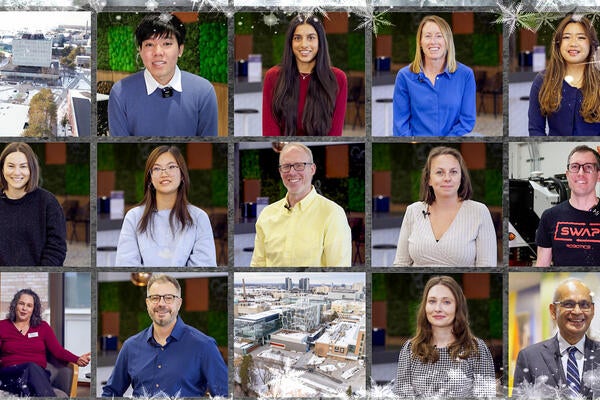
Inspiring inclusion at Waterloo
Panellists at the International Women’s Day breakfast event discuss the role of paying-it-forward to support women on campus and beyond

Panellists at the International Women’s Day breakfast event discuss the role of paying-it-forward to support women on campus and beyond
By Angelica Marie Sanchez University Relations“International Women's Day is a celebration of ideals such as diversity, equity and inclusion, and it is a celebration of the achievements of all women,” said Vivek Goel, University of Waterloo’s president and vice-chancellor, in his opening address at the International Women’s Day (IWD) breakfast event held at Federation Hall.
IWD is marked globally on March 8 each year, and celebrates the social, economic, cultural and political accomplishments of women. The half-day event at Waterloo welcomed more than 300 guests from campus and the community and recognized the many exceptional faculty, students, staff and alumni.
Goel invited Eleanor McMahon, vice-president of University Relations, to the stage as the host and moderator for the event’s panel discussion.

“Today, we salute in a special way to all the women who came before us and paved the way to advance equality and opened the doors for all of us. Each and every one of us has walked through those doors and opened them behind us for everyone else to follow,” McMahon said.
“This year's theme is ‘inspire inclusion’ and is intended to collectively forge a more inclusive world. Because when we inspire women and others to understand and value women's inclusion, we can make our communities, our countries and our world a better place … and when women and adults are inspired to be included, there's a sense of belonging, relevance and empowerment.”
As McMahon introduced each of the panellists, she encouraged the audience to think about the women in their lives that has inspired them, and how we as individuals and as a community can continue paying-it-forward in supporting women on campus and beyond.
McMahon first introduced Jean Becker, vice-president of the Office of Indigenous Relations (OIR), who provided an outlook on the impact of including women and those identifying in the 2SLGBTQIA+ community, and what it means to openly embrace diversity of race, age, ability, faith, body image and how they identify.
Neela Hassan, a PhD student, then discussed how she first came to Canada as a refugee from Afghanistan, scared of the life waiting for her as she was about to embark on her doctorate degree without a community to support her. Now, she looks back on her journey to becoming the president and CEO of the Graduate Student Association at Waterloo.
“Those efforts gave me a sense of empowerment and autonomy, and by creating a safe space for people to be their authentic selves — their vulnerabilities, cultural backgrounds, values and life experiences, without having fear of being judged or rejected — it not only promotes deeper connection and understanding among our community members, but also enriches the collective experience by showing the diversity of biases and narratives,” Hassan said.
Hassan’s story demonstrated how ensuring meaningful inclusion, especially for those who experience multi-layered marginalization, can make a difference in someone’s journey.
Waterloo alumni, Jennifer Lee (BA ’00), vice-chairwoman at Deloitte Canada, and Melissa Ireland (BA ’09), director of OIR, also discussed their respective journeys as women in the business and academic industry. The shared their heartfelt stories of the women who inspired their personal and academic success.
They joined Hassan and McMahon for a Q and A session with the audience. All three panellists shared not only their advice for female or female-identifying students as they begin their career journey, but also the defining reasons that keep them going after each step in their successful careers.
Owning your heritage and individual paths in life, telling your story, and finding autonomy in your experiences, were a few of the key takeaways that the panellists encouraged the audience to remember as they navigate the many challenges and hurdles that women face daily.
During the closing remarks, Dr. Anita Taylor, acting associate vice-president, Equity, Diversity, Inclusion and Anti-Racism office, shared how she was inspired by her own mother’s commitment to using her time and resources to help others succeed, and she encouraged the audience to do the same whether it’s through volunteer or mentorship.

"I want you to think about how you can use your resources, power, privilege and position to empower the women that are around you. My second challenge is to think about how you can show your appreciation and gratitude to a woman who has inspired or motivated you,” Taylor added.
The audience was left feeling inspired, empowered and moved by the powerful messages and stories that were shared.
While this year’s theme is “inspire inclusion”, IWD continues to be a reminder that every day there is a need for a more inclusive world, where women can feel empowered, inspired and have a sense of belonging.

Read more
From optometry and pharmacy to public health and therapeutics, Waterloo alumni are powering Canada’s health care sector

Read more
A winter holiday message from President Vivek Goel

Read more
Researchers awarded funding to investigate ecology, climate change, repatriation, health and well-being through cultural and historical lens
The University of Waterloo acknowledges that much of our work takes place on the traditional territory of the Neutral, Anishinaabeg, and Haudenosaunee peoples. Our main campus is situated on the Haldimand Tract, the land granted to the Six Nations that includes six miles on each side of the Grand River. Our active work toward reconciliation takes place across our campuses through research, learning, teaching, and community building, and is co-ordinated within the Office of Indigenous Relations.